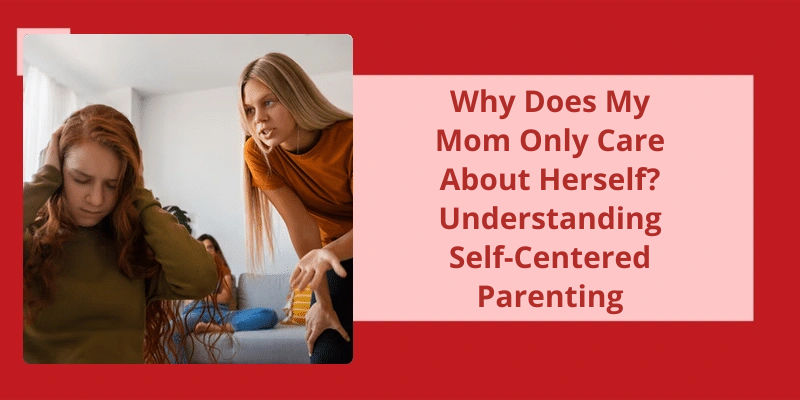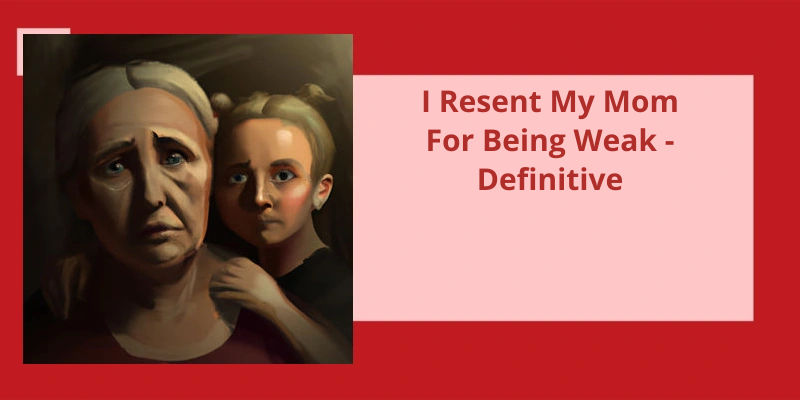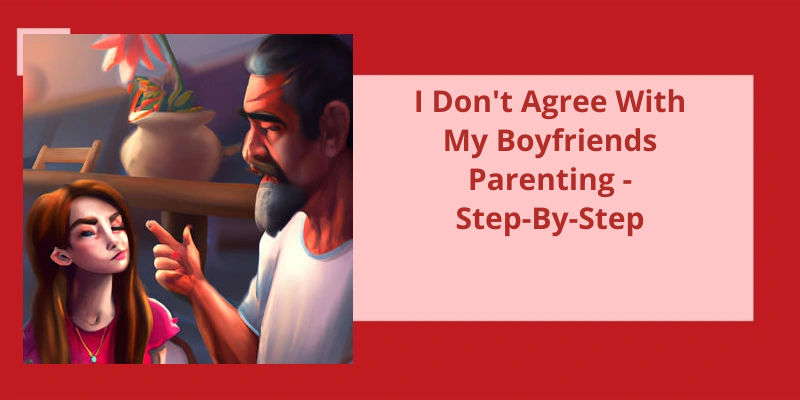As human beings, we all have different priorities and concerns in life. While some individuals tend to be more empathetic and altruistic towards others, others may have a more self-oriented mindset. One might ask themselves, "why does my mom only care about herself?" This is a complex question that can’t be answered simply. There could be numerous reasons why our mothers may appear to be self-centered, such as long-term effects of trauma, busy schedules, or simply a lack of awareness. Each person's background and experiences shape their personality and behavior, which may differ from one another's. It’s important to acknowledge and understand the reasons behind such behavior, as it not only benefits our relationship with our parents but also helps us to empathize and connect with others on a deeper level.
Is My Mother a Narcissist or Just Selfish?
It’s important to note that not all selfish behavior automatically means someone is a narcissist. It’s possible that your mom simply has a habit of putting her own needs and desires above others, without necessarily exhibiting all the traits of narcissistic personality disorder. However, if her behavior is consistently manipulative and lacks empathy or consideration for others, it’s worth looking into whether she meets the criteria for narcissism.
One key indicator is how your mom responds to criticism or feedback. If she becomes defensive, dismissive, or tries to turn the conversation back to herself, this could be a sign of narcissism. Narcissists often struggle with self-reflection and may feel threatened by any perceived attack on their ego. Additionally, they may have a tendency to project their own flaws onto others, blaming others for problems that are really their own.
If your relationship with your mom feels consistently one-sided or emotionally draining, it may be worth seeking support from a therapist or counselor. Narcissistic behavior can be difficult to navigate on your own, and it can be especially challenging if youre living with or financially dependent on the person in question. A mental health professional can help you better understand your moms behavior and develop strategies for setting boundaries and maintaining your own well-being.
How to Confront a Narcissistic Parent
- Set boundaries and stick to them.
- Don’t engage in arguments or try to reason with them.
- Try to avoid triggering topics or situations.
- Take care of yourself and prioritize your own needs.
- Seek support from a therapist or support group.
- Consider setting up limited contact or going no contact if necessary.
Navigating a relationship with a self-absorbed parent can be challenging, especially when it’s your mother. But how exactly do you know if your mom is self-centered? If she exhibits attributes such as grandiosity, preoccupation with success and beauty, and a belief that she’s superior to others, it may be a sign that she’s more focused on herself than on her relationship with you. In the next section, we’ll explore more about what it means to have a self-absorbed mother and how to cope with it.
How Do You Know if Your Mom Is Self-Centered?
(4) She lacks empathy for others and only focuses on her own needs and wants. (5) She constantly seeks attention and admiration from others, even if it means putting others down or manipulating them. (6) She may have a history of disregarding boundaries and making everything about herself.
If you suspect that your mother may be self-centered, it can be helpful to reflect on her behavior and actions. Does she constantly talk about herself and her accomplishments without showing interest in your life? Does she expect you to cater to her needs and emotions, but dismisses yours? Does she have a tendency to manipulate or guilt trip you into doing things for her? If you answered yes to any of these questions, then there may be a possibility that your mother is self-absorbed.
It’s important to remember that a self-centered mother’s behavior can have a significant impact on her children’s sense of self-worth and emotional wellbeing. Children of self-absorbed mothers may experience feelings of neglect, guilt, and low self-esteem. If you feel that your relationship with your mother is negatively impacting your mental health, seeking support from a therapist can be a helpful option.
It’s worth noting that self-absorption can manifest in different ways and may not be limited to just mothers. Some individuals may display these traits in various relationships and situations. It’s important to recognize and address any toxic behavior that may be present in our relationships in order to maintain a healthy level of emotional wellbeing and self-respect.
Identifying a self-absorbed mother can be a difficult and complex process, but it’s important to recognize the potential lasting impact that this behavior can have on you as her child. If you feel overwhelmed or confused, it can be helpful to find support from a therapist or trusted individual in order to process your emotions. Remember that establishing healthy boundaries and prioritizing your own needs is crucial in maintaining a positive and fulfilling relationship with yourself and those around you.
Strategies for Setting Healthy Boundaries With a Self-Centered Mother.
Setting healthy boundaries with a self-centered mother requires strategies that prioritize your emotional needs. One of the best ways to begin setting boundaries is by identifying your values and beliefs, so you can assertively communicate your needs to your mother. Make sure to maintain calm and clear communication by avoiding blame or shaming language, and try to be consistent and persistent in your boundaries. Remember that healthy boundaries aren’t punitive, and can ultimately help strengthen relationships while protecting your emotional wellbeing.
Source: What Makes A Self-Absorbed Narcissistic Mother?
When it comes to dealing with a self-centered mother, setting boundaries is crucial. Fortunately, there are several ways to achieve this. One effective approach is to remain calm and not react emotionally to whatever your mother says, even if it’s hurtful. Additionally, planning your responses ahead of time can be helpful to avoid getting caught in a cycle of negativity. As we explore further ways to cope with a narcissistic mother, keep in mind that different strategies work for different people, so it’s essential to find what works best for you.
How Do You Deal With a Self Centered Mother?
Dealing with a self-centered mother can be difficult and emotionally draining. It can feel like you’re walking on eggshells around her, constantly trying to avoid triggering her outbursts. If your mother is a narcissist, it’s important to set boundaries and create some distance between the two of you. One way to do this is to build a support system outside of your relationship with her. This could mean confiding in a trusted friend or seeking help from a therapist.
Planning your responses is also important when dealing with a self-centered mother. This means anticipating what she might say or do, and preparing how you’ll respond. Having a respectful exit strategy when conversations go off the rails can help you avoid getting trapped in a cycle of arguing and frustration. It’s also important to be clear and direct in your communication with her, while also being respectful and empathetic.
This can be a difficult realization to accept, but it’s important for your own mental health and well-being. You may need to limit your contact with her or even cut ties altogether if her behavior is consistently harmful and toxic. Remember that you deserve to be treated with respect and kindness, and don’t be afraid to prioritize your own needs and emotions in this situation.
Conclusion
In conclusion, the question of why one's mother only cares about herself is a complex and deeply personal one. While it’s easy to feel frustrated and neglected in such a situation, it’s important to remember that every individual has their own unique set of experiences, emotions, and priorities that shape their behavior and relationships. It may be helpful to try and engage in open and honest communication with one's mother, or to seek support from trusted friends or family members. Ultimately, it’s up to each person to determine how they want to approach and address this issue, and to prioritize their own well-being and happiness above all else.






